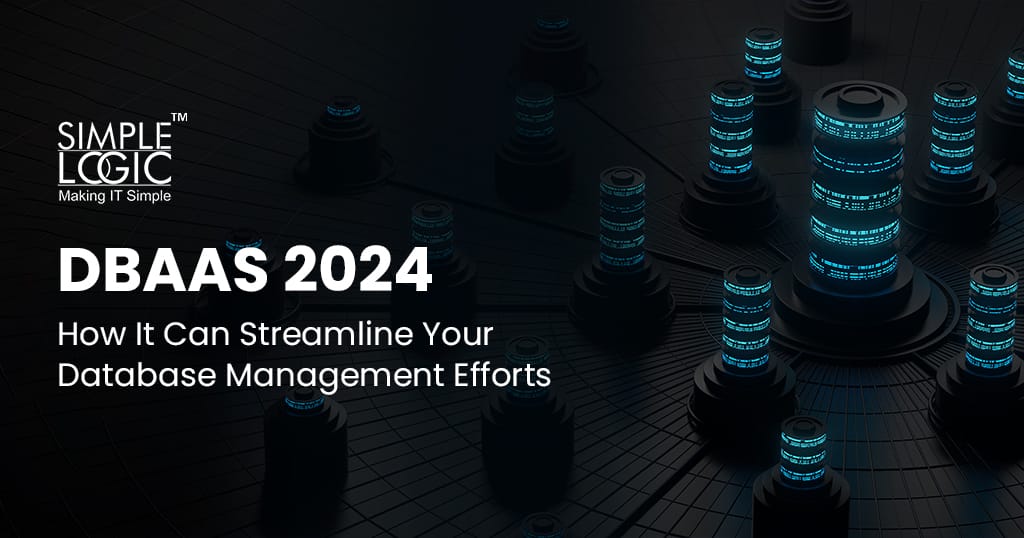Looking for a way to make it easier to manage your database and reduce costs? There’s always this new, modern cloud solution that would give a business full access to databases on demand without the need for the business to worry over the infrastructure that supports it.
Managing databases can be complex and time-consuming. However, with DBaaS, you focus on what’s most important—growing your business—and leave the technical details to the experts.
In the article, we’ll walk you through everything you need to know about Database as a Service: how it works, advantages, top providers, and how to choose the right DBaaS provider for your needs.
What is Database or DBaaS as a Service?
Database or DBaaS as a Service, is one of the cloud services provided by a provider that allows business usage of database management systems without dealing with physical hardware, actual software, and maintenance tasks. Unlike a database where there is a strong call for the investments in good physical equipment, DBaaS is provided within the cloud to help satisfy the dynamic needs of businesses of today.
All these the DBaaS provider does for you thus taking the burden of installation and updates, security and scaling. So, the company can, thus, concentrate on their core business instead of handling the database. Whether a startup or a large corporation, DBaaS is an effective solution for top performance at a reduced cost that could grow with your business.
 How Does DBaaS Work?
How Does DBaaS Work?
The purpose of DBaaS is to simplify database management. Here’s how it works:
- Provisioning: You can create new databases through a web interface or API offered by the DBaaS provider. This includes choosing the database type and setting up the necessary resources.
- Deployment: Once the database is created, the provider handles its deployment in the cloud. The provider takes care of server setup, storage, and networking to ensure everything runs smoothly.
- Management: The DBaaS provider is responsible for maintaining the database, which includes updates, backups, patching, monitoring, and adjusting for workload changes.
- Scaling and Optimization: As your database grows, DBaaS platforms automatically add more resources to ensure everything runs efficiently, eliminating the need for manual intervention.
- Security: Security is a key feature of DBaaS. DBaaS providers use encryption, firewalls, multi-factor authentication, and regular audits to protect data.
Key Features of DBaaS
- Automatic Scalability and Performance Management
DBaaS platforms adjust the amount of computing power, storage, and memory based on what the database needs, ensuring it runs smoothly even during high demand. - High Availability and Disaster Recovery
DBaaS providers include failover mechanisms and backups to ensure that your database remains accessible, even if there’s a hardware failure. Automated recovery options help keep your data safe. - Security and Compliance
Security is a top priority for DBaaS. Most DBaaS providers offer strong encryption and security measures to protect sensitive data, and many platforms meet industry standards like GDPR, HIPAA, and PCI-DSS. - Cost Efficiency
With DBaaS, you only pay for the resources you use, which eliminates the need for large upfront investments. The subscription model also makes it easier to plan your IT expenses. - Ease of Use and Management
DBaaS platforms offer easy-to-use dashboards and APIs, allowing users to manage and monitor databases without needing in-depth technical knowledge.
Benefits of DBaaS
- Streamlined Database Management
DBaaS removes the burden of complex database tasks that a business has to manage, ensuring your IT team is released from severe burdens.
- Cost Efficiency
From a DBaaS provider, one is relieved from paying for a hardware gadget as well as its infrastructural maintenance. You only pay for what you need; this saves you money.
- Faster Time-to-Market
DBaaS platforms make it easy and relatively fast to deploy databases, thereby hastening the launching of new applications or services into the market.
- Scalability for Rising Data Needs
DBaaS is scalable. The scalability of DBaaS is easier and ensures that your database grows with your business without affecting its performance.
- Better Performance and Reliability
DBaaS uses automated resource management and failover systems to ensure your database is always there, performance-oriented, even at heavy workloads. - Better Security
DBaaS ensures protection of data against unauthorised access and breach by using advanced security features like encryption, regular audits, and more.
Top DBaaS Providers in 2025
- Amazon Web Services (AWS) – RDS (Relational Database Service)
- Features: Supports various database engines, such as MySQL, PostgreSQL, and SQL Server. Offers automatic backups, encryption, and high availability.
- Pricing: Pay-as-you-go, with options for reserved instances.
- Why Choose AWS RDS?: AWS RDS is versatile and reliable, making it a great choice for businesses of all sizes that need strong security and performance.
- Microsoft Azure – SQL Database
- Features: Fully managed service with automatic scaling, high availability, and AI-powered performance improvements.
- Pricing: Varies based on performance and storage needs.
- Why Choose Azure SQL Database?: This is a good option for businesses that alrea dy use Microsoft products, offering seamless integration and advanced features.
- Google Cloud – Cloud SQL
- Features: Supports MySQL, PostgreSQL, and SQL Server with automatic failover and managed backups.
- Pricing: Flexible pricing based on machine type and usage.
- Why Choose Google Cloud SQL?: Great integration with other Google Cloud services, making it a reliable choice for data-heavy applications.
- IBM Cloud – Db2 on Cloud
- Features: A fully managed solution with built-in high availability, automated backups, and strong security.
- Pricing: Tiered based on storage and computing needs.
- Why Choose IBM Db2 on Cloud?: Known for its enterprise-grade security and reliability, making it ideal for businesses with high security needs.
- Oracle Cloud – Oracle Autonomous Database
- Features: Self-managing, with automatic scaling and patching.
- Pricing: Pay-as-you-go or reserved pricing options.
- Why Choose Oracle Autonomous Database?: Best for businesses seeking a hands-off, high-performance solution with built-in security.
How to Choose the Right DBaaS Provider
Choosing the right DBaaS provider depends on your specific business needs. Here are some factors to consider:
- Performance and Scalability: Choose a provider that can handle your database’s performance needs and scale as your data grows.
- Security and Compliance: Ensure the provider offers strong security features and meets the necessary industry standards.
- Cost: Look at pricing models to ensure they align with your budget while offering the features you need.
- Support and Reliability: Go with a provider known for reliable service and strong customer support.
- Integration with Existing Systems: Ensure the DBaaS integrates well with your current infrastructure and tools.
Why Choose Simple Logic for Database or DBaaS as a Service?
At Simple Logic, we focus on delivering reliable, scalable, and secure DBaaS solutions tailored to your business’s database needs. Here’s why we are the ideal choice for your DBaaS requirements:
- DBaaS Expertise: With extensive experience in managing cloud-based databases, we ensure your database is optimised for performance, security, and growth, so you can focus on your business.
- Customizable DBaaS Solutions: Every business has different data requirements. We provide fully customizable DBaaS solutions to match your specific needs and maximise database efficiency.
- Data Security and Compliance: We prioritise your database security with advanced encryption and compliance with global standards like GDPR and HIPAA, keeping your data safe and protected.
- 24/7 DBaaS Support: Our team offers continuous monitoring and support, ensuring your database runs smoothly with minimal downtime and rapid issue resolution.
- Scalable and Cost-Effective: Our DBaaS grows with your business, providing scalable and cost-efficient solutions that adapt as your data needs evolve.
Use Cases for DBaaS
- Startups and Small Businesses
DBaaS provides startups with access to powerful databases without needing to spend heavily on hardware. - E-commerce Platforms
E-commerce sites benefit from DBaaS by scaling quickly during high traffic periods, ensuring smooth transactions and real-time data tracking. - SaaS Providers
SaaS providers rely on DBaaS to deploy and scale applications quickly, while also managing data securely and efficiently. - Data-Driven Enterprises
Companies that rely on data for analytics use DBaaS to process large amounts of data in real-time.
Future Trends in DBaaS
- Increased Adoption of Multi-Cloud
More businesses are using multiple cloud providers for flexibility, and DBaaS providers are responding by improving multi-cloud capabilities. - AI and Machine Learning Integration
Expect more DBaaS platforms to incorporate AI to automate tasks such as performance optimization and detecting issues before they become problems. - Security Improvements
With data privacy becoming more important, DBaaS providers are stepping up their security measures to meet stricter regulations. - Serverless Databases
More DBaaS providers are moving towards serverless models, allowing businesses to automatically scale databases without managing servers.
Wrapping Up Database or DBaaS as a Service
Database as a Service (DBaaS) offers businesses a practical way to manage databases without the complexities and costs of traditional setups. Whether you’re a small business or a large enterprise, the flexibility and efficiency that DBaaS providers offer make it a great choice for modern data management.
Looking to streamline your database management? Simple Logic can help. We provide fully managed database services to ensure your data is secure, accessible, and running smoothly.
Let us take care of your database needs, so you can focus on what really matters—growing your business. Visit SimpleLogic.IT today to learn more about how we can help your business with reliable cloud database services.
FAQs on Database or DBaaS as a Service
-
What is Database as a Service (DBaaS)?
- DBaaS is a cloud computing service that provides access to database software without the need for physical hardware or maintenance.
-
How does DBaaS work?
- DBaaS hosts databases on cloud infrastructure, allowing users to manage them through web interfaces or APIs, with the service provider handling maintenance and scaling.
-
What are the benefits of using DBaaS?
- DBaaS offers cost savings, scalability, simplified management, rapid deployment, enhanced security, and high availability.
-
How does DBaaS ensure data security?
- DBaaS providers implement enterprise-grade security measures, including data encryption and compliance with regulatory standards.
-
What factors should be considered when choosing a DBaaS provider?
- Consider database technology compatibility, scalability, performance, security features, and the provider’s compliance with industry standards.





